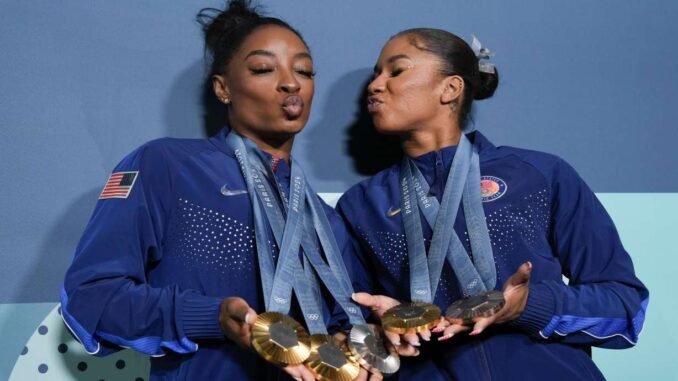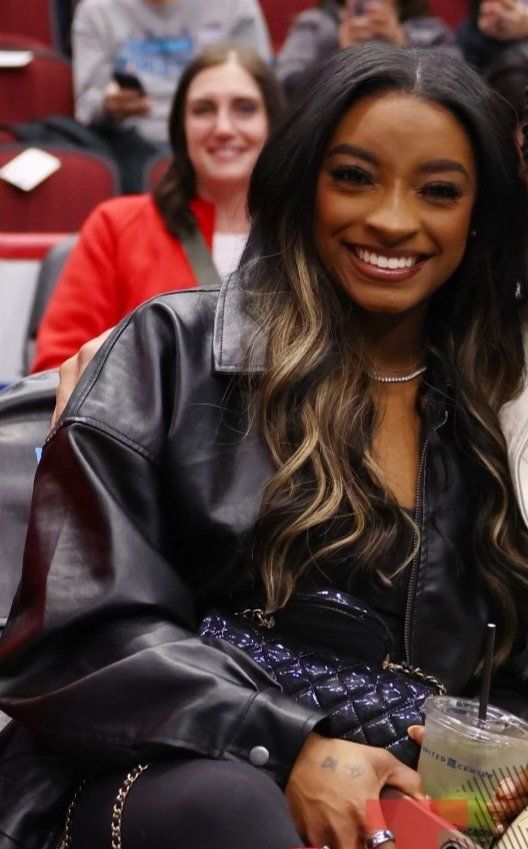
Biles and Gaines engaged in a verbal back-and-forth on X on Friday after Gaines attacked Minnesota’s high school interscholastic governing body for allowing a transgender girl to compete in the girl’s state softball tournament. Champlin Park, with the transgender girl on the mound, won the state 4A championship 6-0. Biles responded to that tweet, calling Gaines a “sore loser” and a “bully.”
Gaines — a former swimmer at the University of Kentucky — became a public figure in 2022, when she argued against the inclusion of transgender women participating in women’s sports after she tied for fifth with transgender swimmer Lia Thomas at a meet. Gaines has continued to lobby for that cause, and appeared in a video on the United States Department of Health and Human Services website in February which argued against allowing transgender women to participate in women’s sports. Gaines responded to Biles’ post Friday, calling it “disappointing.” Over the weekend, Gaines tweeted or shared at least 15 tweets mentioning Biles.
In recent weeks, a public dispute between Olympic gymnast Simone Biles and former college swimmer Riley Gaines has sparked widespread discussion about the inclusion of transgender athletes in women’s sports. The controversy began when Gaines criticized a Minnesota high school softball team for allowing a transgender pitcher to compete. Biles responded by defending the inclusion of transgender athletes, leading to a heated exchange on social media.
The Origins of the Dispute
The conflict escalated when Biles referred to Gaines as a “sore loser” and accused her of bullying. In response, Gaines dismissed Biles’s comments as disappointing and maintained her stance that transgender women should not compete in women’s sports. This exchange drew significant attention from the public and media.
Biles’s Apology and Clarification
Amid the backlash, Biles issued a public apology, expressing regret for her personal remarks and emphasizing the importance of both competitive fairness and inclusivity in sports. She clarified that her comments were not meant to undermine fairness but to defend athletes from harmful scrutiny. Biles stressed the need for empathy and respect in navigating sensitive issues.
Gaines’s Response
Gaines accepted Biles’s apology but reiterated her belief that allowing transgender athletes to compete in women’s sports undermines fairness. She emphasized the importance of protecting opportunities for cisgender female athletes and preserving the integrity of women’s sports.
The Debate Over Transgender Athletes in Women’s Sports
The Case for Inclusivity
Advocates for the inclusion of transgender athletes argue that sports should be accessible to all individuals, regardless of gender identity. They emphasize the importance of creating inclusive environments that allow transgender athletes to compete in accordance with their gender identity.
The Case for Competitive Fairness
Opponents of transgender inclusion in women’s sports argue that transgender women may have physical advantages over cisgender women, potentially compromising the fairness of competition. They advocate for policies that ensure a level playing field for all athletes.
Proposed Solutions
Some have proposed the creation of separate categories for transgender athletes to compete, allowing for inclusivity while maintaining competitive fairness. Others suggest implementing hormone level regulations to ensure that transgender athletes do not have an unfair advantage.
The Role of Title IX in the Debate
Understanding Title IX
Title IX is a federal law that prohibits discrimination on the basis of sex in educational programs and activities, including sports. The law has been instrumental in promoting gender equality in athletics.
Impact on Women’s Sports
Title IX has led to increased opportunities for women in sports, contributing to the growth and development of women’s athletics programs across the country.
Challenges to Title IX
Some argue that the inclusion of transgender athletes in women’s sports may conflict with the intent of Title IX, potentially disadvantaging cisgender female athletes. This has led to calls for a reevaluation of policies to ensure that the protections afforded by Title IX are upheld.
Public Reactions and Media Coverage
Support for Biles
Many individuals and organizations have expressed support for Biles’s stance on inclusivity, praising her for advocating for the rights of transgender athletes. Supporters argue that her apology demonstrates a commitment to fostering understanding and respect in the sports community.
Support for Gaines
Others have expressed support for Gaines’s position, agreeing with her concerns about competitive fairness and the potential disadvantages faced by cisgender female athletes. They commend her for speaking out on behalf of women in sports.
Media Coverage
The media has extensively covered the dispute between Biles and Gaines, highlighting the complexities of the issue and the diverse perspectives involved. The coverage has contributed to a broader public discussion about the inclusion of transgender athletes in women’s sports.
Moving Forward: Finding Common Ground
The Importance of Dialogue
The exchange between Biles and Gaines underscores the need for open and respectful dialogue on sensitive issues. Engaging in constructive conversations can lead to a better understanding of differing viewpoints and help identify solutions that balance inclusivity and fairness.
Collaborative Efforts
Both Biles and Gaines have expressed a willingness to work together to promote fairness and inclusivity in sports. Collaborative efforts can lead to the development of policies that respect the rights of all athletes while maintaining the integrity of competition.
Educational Initiatives
Educational programs can play a crucial role in fostering understanding and respect among athletes, coaches, and administrators. By promoting awareness of the challenges faced by transgender athletes and the importance of inclusivity, these programs can help create more supportive environments in sports.

Conclusion: A Path Toward Unity
The public dispute between Simone Biles and Riley Gaines has highlighted the complexities surrounding the inclusion of transgender athletes in women’s sports. While their perspectives differ, both athletes have demonstrated a commitment to fairness and inclusivity. By engaging in respectful dialogue and collaborative efforts, the sports community can work toward solutions that uphold the principles of equity and respect for all athletes.